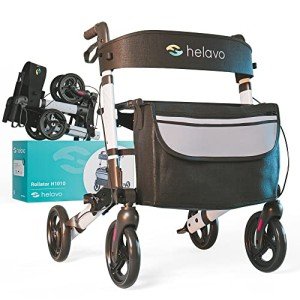Understanding Rollators for Seniors: A Comprehensive Guide
As people age, maintaining mobility and self-reliance ends up being increasingly essential. One tool that has reinvented senior mobility is the rollator. More than just a walking aid, rollators supply stability, support, and even a place to rest, allowing seniors to browse their environments with self-confidence. In this thorough guide, we will examine what a rollator is, its benefits, types, features, and crucial considerations for purchase. In Advanced Mobility Aid , we will attend to some often asked concerns to assist readers make notified choices.
What is a Rollator?
A rollator is a type of wheeled walker equipped with 3 or four wheels, hand brakes, and a seat. Unlike basic walkers, which require the user to raise them with each step, rollators allow users to press the walker while walking, offering more support and stability. They are specifically designed for individuals who may have balance issues and need assistance navigating without sacrificing self-reliance.
Advantages of Using a Rollator
The benefits of utilizing a rollator for seniors are numerous. Here are some key benefits:
- Enhanced Mobility: Rollators enable seniors to walk more with confidence and easily without the need to entirely depend on others for support.
- Benefit: With integrated seats, users can take a break whenever they need to, thereby minimizing fatigue throughout trips or errands.
- Safety Features: Many rollators come with handbrakes that enable users to stop and secure the walker in location, reducing the risk of falls.
- Storage Options: Some rollators come geared up with storage compartments or baskets, making it much easier to carry personal products like bags, groceries, or medical products.
Kinds of Rollators
Rollators are available in various models tailored to various needs and choices. Here's a breakdown of the most common types:
| Type of Rollator | Description | Perfect for |
|---|---|---|
| Requirement Rollator | Usually features 4 wheels and a comfortable seat for resting. | Most seniors needing fundamental support. |
| Indoor Rollator | Designed for usage inside the home, with slimmer frames for maneuverability. | Seniors requiring to browse tight areas. |
| Heavy-Duty Rollator | Built with a more powerful frame to support greater weight capabilities. | Bigger people who require strong support. |
| Lightweight Rollator | Made from lightweight products for easy transport and handling. | Seniors who travel often or require to raise the rollator. |
| Rollator with Seat | Features a seat integrated into the frame, offering a resting alternative. | Seniors who might tire easily or take pleasure in longer strolls. |
| Three-Wheel Rollator | Deals maneuverability and is created for tight areas. | Seniors needing to navigate small locations. |
| Rollators with Accessories | Equipped with trays, baskets, or umbrellas for added benefit. | Seniors seeking additional functionality. |
Features to Consider When Buying a Rollator
When selecting a rollator, various features can enhance the experience for seniors. Here's a list of important features and considerations:
Weight Capacity
- Make sure the rollator can support the user's weight comfortably.
Seat Height
- The seat should be at a comfortable height for the user, allowing easy access.
Handle Height Adjustability
- Look for rollators with adjustable deals with so that users can find their perfect height.
Brakes
- Hand brakes should be easy to engage and disengage, and they should lock firmly.
Wheels
- Larger wheels can deal with irregular outdoor surface areas much better than smaller sized ones.
Frame Material
- Lightweight frames are much easier to maneuver, especially for seniors with reduced strength.
Mobility
- Foldable rollators are easier to save or transport in a vehicle.
Storage Options
- Look for baskets or trays for bring items, boosting practicality during getaways.
Accessories
- Some rollators feature added accessories like bags, cup holders, or perhaps a flashlight, which can improve use.
Design and Color
- Visual choice is also necessary; selecting a rollator that appeals to the user can make a big difference in encouraging regular usage.
Regularly Asked Questions (FAQ)
Q1: Who should use a rollator?
- Rollators are perfect for people who have problem walking due to age, injury, or medical conditions such as arthritis or post-surgery recovery.
Q2: How much do rollators typically cost?
- Rates for rollators can range widely, from around ₤ 70 to over ₤ 300, depending upon features, products, and brand.
Q3: Can rollators be utilized outdoors?
- Yes, numerous rollators are developed for both indoor and outdoor use. Try to find designs with bigger wheels for outdoor navigation.
Q4: Are rollators adjustable?
- Many rollators have adjustable handles and seat heights to accommodate various user sizes and choices.
Q5: Do I need a prescription to buy a rollator?
- Usually, a prescription is not required to buy a rollator. However, speaking with a doctor can offer customized suggestions.
Utilizing a rollator can significantly enhance the lifestyle for seniors, improving their mobility while promoting independence. When choosing the ideal rollator, consider aspects such as weight capability, height adjustability, and additional features to discover the perfect match. With the best rollator, seniors can enjoy higher flexibility, self-confidence, and comfort in their day-to-day lives. Whether for a stroll in the park or running errands, a rollator could very well be the key to maintaining an active way of life as one ages.

